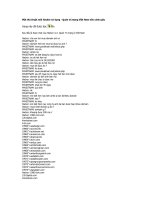Uploading một tập tin vào database sử dụng System.Data.OleDb
Bạn đang xem bản rút gọn của tài liệu. Xem và tải ngay bản đầy đủ của tài liệu tại đây (66.6 KB, 6 trang )
Uploading một tập tin vào database sử dụng System.Data.OleDb
Chúng tôi đã từng giới thiệu với các bạn làm thế nào để upload một tập tin vào database bằng ngôn
ngữ VB, hôm nay chúng tôi xin giới thiệu với các bạn cách upload một tập tin vào database trong .NET.
Sử dụng Sql .NET Data Provider rất giống insert một mảng các byte vào Database sử dụng OLEDB
SQL Code:
CREATE TABLE [dbo].[Images] (
[ImageID] [int] IDENTITY (1, 1) NOT NULL ,
[Image] [image] NULL ,
[ContentType] [varchar] (50) COLLATE SQL_Latin1_General_CP1_CI_AS NULL ,
[ImageDescription] [varchar] (100) COLLATE SQL_Latin1_General_CP1_CI_AS NULL ,
[ByteSize] [int] NULL
) ON [PRIMARY] TEXTIMAGE_ON [PRIMARY]
GO
Web Form Code:
<%@ Page Inherits=''UploadSample.Main'' SRC=''Upload.cs''%>
<HTML>
<BODY>
<FORM ENCTYPE=''multipart/form-data'' RUNAT=''server'' ID=''Form1''>
<h1>
File Upload To Database Using <FONT COLOR=''BLUE''>System.Data.OleDb</FONT>
</h1>
<TABLE RUNAT=''server'' WIDTH=''700'' ALIGN=''left'' ID=''Table1''>
<TR>
<TD>
<B>Upload File</B>
</TD>
<TD>
<INPUT TYPE=''file'' ID=''UP_FILE'' RUNAT=''server'' STYLE=''Width:320'' ACCEPT=''text/*''
NAME=''UP_FILE''>
</TD>
</TR>
<TR>
<TD>
<b>Description of File</b>
</TD>
<TD>
<asp:TextBox RUNAT=''server'' WIDTH=''239'' ID=''txtDescription'' MAINTAINSTATE=''false'' />
</TD>
</TR>
<TR>
<TD>
<asp:Label RUNAT=''server'' ID=''txtMessage'' FORECOLOR=''red'' MAINTAINSTATE=''false'' />
</TD>
<TD>
<asp:Button RUNAT=''server'' WIDTH=''239'' ONCLICK=''Button_Submit'' TEXT=''Upload Image'' />
</TD>
</TR>
</TABLE>
</FORM>
</BODY>
</HTML>
Đằng sau WEB Form Code
namespace UploadSample {
public class Main : System.Web.UI.Page {
protected System.Web.UI.HtmlControls.HtmlInputFile UP_FILE;
protected System.Web.UI.WebControls.TextBox txtDescription;
protected System.Web.UI.WebControls.Label txtMessage;
protected System.Int32 FileLength = 0;
protected void Button_Submit(System.Object sender, System.EventArgs e) {
System.Web.HttpPostedFile UpFile = UP_FILE.PostedFile;
FileLength = UpFile.ContentLength;
try {
if (FileLength == 0) {
txtMessage.Text = ''<b>* You must pick a file to upload</b>'';
} else {
System.Byte[] FileByteArray = new System.Byte[FileLength];
System.IO.Stream StreamObject = UpFile.InputStream;
StreamObject.Read(FileByteArray,0,FileLength);
System.Data.OleDb.OleDbConnection Con = new
System.Data.OleDb.OleDbConnection(''Provider=SQLOLEDB;Data Source=localhost;'' +
''Integrated Security=SSPI;Initial Catalog=northwind'');
System.String SqlCmd = ''INSERT INTO Images (Image, ContentType, ImageDescription, ByteSize)
VALUES (?, ?, ?, ?)'';
System.Data.OleDb.OleDbCommand OleDbCmdObj = new
System.Data.OleDb.OleDbCommand(SqlCmd, Con);
OleDbCmdObj.Parameters.Add(''@Image'', System.Data.OleDb.OleDbType.Binary, FileLength).Value =
FileByteArray;
OleDbCmdObj.Parameters.Add(''@ContentType'', System.Data.OleDb.OleDbType.VarChar,50).Value =
UpFile.ContentType;
OleDbCmdObj.Parameters.Add(''@ImageDescription'',
System.Data.OleDb.OleDbType.VarChar,100).Value = txtDescription.Text;
OleDbCmdObj.Parameters.Add(''@ByteSize'', System.Data.OleDb.OleDbType.VarChar,100).Value =
UpFile.ContentLength;
Con.Open();
OleDbCmdObj.ExecuteNonQuery();
Con.Close();
txtMessage.Text = ''<p><b>* Your image has been uploaded</b>'';
}
} catch (System.Exception ex) {
txtMessage.Text = ex.Message.ToString();
}
}
}
}
Bởi vì giới hạn của kiểu data type Image là 2,147,483,647 và hầu hết mọi người sẽ không upload một
tập tin có kích thước lớn như vậy vào trong một database nhưng bởi vì không có OleDbType.Image
chúng ta phải sử dụng OleDbType.Binary với giới hạn là 8000 Byte và chúng ta set kích thước trong ví
dụ này:
OleDbCmdObj.Parameters.Add(''@Image'', System.Data.OleDb.OleDbType.Binary, FileLength).Value =
FileByteArray;
Thêm một trường tổng vào trong một DataGrid (ASP.NET)
Trong mẹo lập trinh hôm nay chúng tôi sẽ hướng dẫn các bạn cách làm thế nào để chương trình tự
động tính tổng của một cột trong DataGrid, và hiển thị tổng trong footer của DataGrid.
Bạn sẽ dùng một Web Form (calcTotals.aspx) và một đoạn code sau lớp tập tin này
(calcTotals.aspx.cs)
Sau đây là code calcTotals.aspx:
<%@ Page Inherits=''myApp.calcTotals'' Src=''20010731T0101.aspx.cs'' %>
<html>
<body bgcolor=''white''>
<asp:DataGrid id=''MyGrid'' runat=''server''
AutoGenerateColumns=''False''
CellPadding=''4'' CellSpacing=''0''
BorderStyle=''Solid'' BorderWidth=''1''
Gridlines=''None'' BorderColor=''Black''
ItemStyle-Font-Name=''Verdana''
ItemStyle-Font-Size=''9pt''
HeaderStyle-Font-Name=''Verdana''
HeaderStyle-Font-Size=''10pt''
HeaderStyle-Font-Bold=''True''
HeaderStyle-ForeColor=''White''
HeaderStyle-BackColor=''Blue''
FooterStyle-Font-Name=''Verdana''
FooterStyle-Font-Size=''10pt''
FooterStyle-Font-Bold=''True''
FooterStyle-ForeColor=''White''
FooterStyle-BackColor=''Blue''
OnItemDataBound=''MyDataGrid_ItemDataBound''
ShowFooter=''True''>
<Columns>
<asp:BoundColumn HeaderText=''Title'' DataField=''title'' />
<asp:BoundColumn HeaderText=''Price'' DataField=''price''
ItemStyle-HorizontalAlign=''Right''
HeaderStyle-HorizontalAlign=''Center'' />
</Columns>
</asp:DataGrid>
</body>
</html>
Trong Web Form bạn dùng dấu @ để trang sử dụng code trong phần khai báo. thuộc tính SRC chỉ
code sẽ được biên dịch sử dụng bộ biên dịch JIT.
Code trong lớp sẽ xử lý 2 sự kiện Page_Load event và OnItemDataBound và một phương thức Private
là CalcTotal
using System;
using System.Web;
using System.Web.UI;
using System.Web.UI.WebControls;
using System.Web.UI.HtmlControls;
using System.Data;
using System.Data.SqlClient;
namespace myApp
{
public class calcTotals : Page
{
protected DataGrid MyGrid;
private double runningTotal = 0;
}
}
protected void Page_Load(object sender, EventArgs e)
{
SqlConnection myConnection = new SqlConnection(''server=Localhost;database=pubs;uid=sa;pwd=;'');
SqlCommand myCommand = new SqlCommand(''SELECT title, price FROM Titles WHERE price > 0'',
myConnection);
try
{
myConnection.Open();
MyGrid.DataSource = myCommand.ExecuteReader();
MyGrid.DataBind();
myConnection.Close();
}
catch(Exception ex)
{
HttpContext.Current.Response.Write(ex.ToString());
}
}
private void CalcTotal(string _price)
{
try
{
runningTotal += Double.Parse(_price);
}
catch
{
}
}
Sự kiện MyGrid_ItemDataBound
public void MyDataGrid_ItemDataBound(object sender, DataGridItemEventArgs e)
{
if (e.Item.ItemType == ListItemType.Item || e.Item.ItemType == ListItemType.AlternatingItem)
{
CalcTotal( e.Item.Cells[1].Text );
e.Item.Cells[1].Text = string.Format(''{0:c}'', Convert.ToDouble(e.Item.Cells[1].Text));
}
else if(e.Item.ItemType == ListItemType.Footer )
{
e.Item.Cells[0].Text=''Total'';
e.Item.Cells[1].Text = string.Format(''{0:c}'', runningTotal);
}
}
Truy cập thông tin của DataGrid (.NET)
Chúng tôi có một DataGrid gọi là dgAges, một Label gọi lblName, và một Label gọi lblAge. Nó có một
cột Select, một cột Bound (Name), và một cột Template (Age)
<asp:DataGrid
id=''dgAges''
runat=''server''
AutoGenerateColumns=''False''
OnSelectedIndexChanged='' SelectionChanged''>
<Columns>
<asp:ButtonColumn Text=''Select'' HeaderText='''' CommandName=''Select'' />
<asp:BoundColumn DataField=''Name'' HeaderText=''Name'' />
<asp:TemplateColumn HeaderText=''Age''>
<ItemTemplate>
<%# Container.DataItem(''Age'') %> yrs. old
</ItemTemplate>
</asp:TemplateColumn>
</Columns>
</asp:DataGrid>
<P> </P>
<P><STRONG><U>Current Selection:</U></STRONG></P>
<P><STRONG>Name:</STRONG> <asp:Label id=''lblName'' runat=''server''></asp:Label></P>
<P><STRONG>Age:</STRONG> <asp:Label id=''lblAge'' runat=''server''></asp:Label></P>
Điều đầu tiên bạn nghĩ là sử dụng thuộc tính Text của cell để lấy đoạn text trong đó. Nó chỉ làm việc với
cột Bound
Protected Sub SelectionChanged()
lblName.Text = dgAges.SelectedItem.Cells(1).Text
'Cột Template ..nó sẽ không làm việc
lblAge.Text = dgAges.SelectedItem.Cells(2).Text
End Sub
Bởi vì .NET coi nội dung của BoundColumn là dạng text và nội dung của TemplateColumn là một
DataBoundLiteralControl. Trong .NET luôn xem nội dung của các cột Template như là một tập hợp các
control server. Để set thuộc tính text của lblAge
bạn phải dùng thuộc tính Text của DataBoundLiteralControl. Mỗi cell có một tập hợp các Control mà
chúng ta có thể tham chiếu tới.
Protected Sub SelectionChanged()
'Bound Column... Đúng
lblName.Text = dgAges.SelectedItem.Cells(1).Text
'Template Column... Đúng
lblAge.Text = CType(dgAges.SelectedItem.Cells(2).Controls(0), DataBoundLiteralControl).Text
End Sub
Đừng thất vọng nếu bạn nghĩ làm sao có thể biết đó là DataBoundLiteralControl. Điều quan trọng là
bạn hiểu cách nó làm việc. Bây giờ chúng ta đã biết .NET đưa nội dung của của các cột Template vào
các tập hợp collection trong mỗi cell.
Lưu ý không phải bao giờ Template column cũng có một DataBoundLiteralControl. Nếu bạn có một
control trong temple (TextBox là EditItemTemplate).
Cách làm tốt hơn.
Chúng tôi làm theo một cách hơi khác. Đầu tiên sử dụng một label trong cột Template, vì thế chúng tôi
biết cái gì trong một
DataBoundLiteralControl:
<asp:DataGrid
id=''dgAges''
runat=''server''
AutoGenerateColumns=''False''
OnSelectedIndexChanged='' SelectionChanged''>
<Columns>
<asp:ButtonColumn Text=''Select'' HeaderText='''' CommandName=''Select'' />
<asp:BoundColumn DataField=''Name'' HeaderText=''Name'' />
<asp:TemplateColumn HeaderText=''Age''>
<ItemTemplate>
<asp:Label RunAt=''server'' ID=''lblThisAge'' Text='<%# Container.DataItem(''Age'') %>' /> yrs. old
</ItemTemplate>
</asp:TemplateColumn>
</Columns>
</asp:DataGrid>
<P> </P>
<P><STRONG><U>Current Selection:</U></STRONG></P>
<P><STRONG>Name:</STRONG> <asp:Label id=''lblName'' runat=''server''></asp:Label></P>
<P><STRONG>Age:</STRONG> <asp:Label id=''lblAge'' runat=''server''></asp:Label></P>
Xin lưu ý các điểm sau:









